

Conservation biology: foundations, concepts, applications - Fred Van Dyke. F. galton habits. Richard von Krafft-Ebing. Austrian neurologist, psychiatrist, and nobleman We ask you, humbly: don't scroll away.

Hi, reader in Canada, it seems you use Wikipedia a lot; that's great! It's a little awkward to ask, but this Saturday we need your help. Genome project earth animal and ant genome mapped. Dark matter and blueshift. Ephemeral. Jacopone da Todi. Life[edit] Born Jacopo dei Benedetti, he was a member of a noble family.
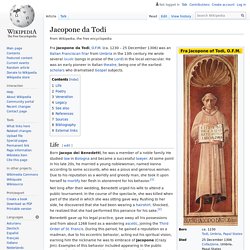
He studied law in Bologna and became a successful lawyer. At some point in his late 20s, he married a young noblewoman, named Vanna according to some accounts, who was a pious and generous woman. Richard Burton. Welsh actor Richard Burton, CBE (/ˈbɜːrtən/; born Richard Walter Jenkins Jr.; 10 November 1925 – 5 August 1984) was a Welsh actor.[1] Noted for his mellifluous baritone voice,[2][3] Burton established himself as a formidable Shakespearean actor in the 1950s, and he gave a memorable performance of Hamlet in 1964.

He was called "the natural successor to Olivier" by critic and dramaturge Kenneth Tynan. Laurence Olivier. 20th-century English actor, director and producer Laurence Kerr Olivier, Baron Olivier, OM (/ˈlɒrəns ˈkɜːr əˈlɪvieɪ/; 22 May 1907 – 11 July 1989) was an English actor and director who, along with his contemporaries Ralph Richardson, Peggy Ashcroft and John Gielgud, dominated the British stage of the mid-20th century.
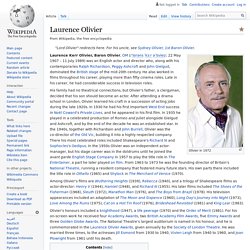
He also worked in films throughout his career, playing more than fifty cinema roles. Late in his career, he had considerable success in television roles. Memetics. This article is related to the study of self-replicating units of culture, not to be confused with Mimesis.
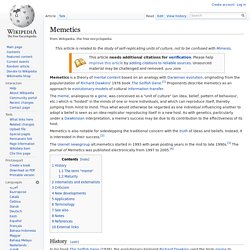
Memetics is a theory of mental content based on an analogy with Darwinian evolution, originating from the popularization of Richard Dawkins' 1976 book The Selfish Gene.[1] Proponents describe memetics as an approach to evolutionary models of cultural information transfer. The meme, analogous to a gene, was conceived as a "unit of culture" (an idea, belief, pattern of behaviour, etc.) which is "hosted" in the minds of one or more individuals, and which can reproduce itself, thereby jumping from mind to mind. Thus what would otherwise be regarded as one individual influencing another to adopt a belief is seen as an idea-replicator reproducing itself in a new host. As with genetics, particularly under a Dawkinsian interpretation, a meme's success may be due to its contribution to the effectiveness of its host. Niko tinbergen. Wonderful Life. Wonderful Life may refer to: Film and television[edit] Music[edit]

Charles Singer. Charles Joseph Singer (2 November 1876 – 10 June 1960) was a British historian of science, technology, and medicine.
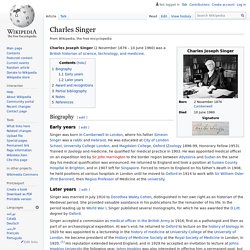
Biography[edit] Early years[edit] Unweaving the Rainbow. Book by Richard Dawkins Unweaving the Rainbow: Science, Delusion and the Appetite for Wonder is a 1998 book by Richard Dawkins, in which the author discusses the relationship between science and the arts from the perspective of a scientist.
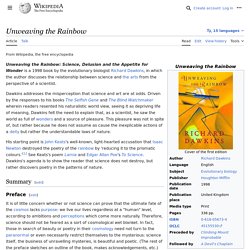
His starting point is John Keats' well-known, light-hearted accusation that Isaac Newton destroyed the poetry of the rainbow by 'reducing it to the prismatic colours. Before the Beginning: Our Universe and Others - Martin J. Rees. The way we will be fifty years from today book. Francis Crick. From Bacteria to Bach and Back. From Bacteria to Bach and Back: The Evolution of Minds is a 2017 book about the origin of human consciousness by philosopher Daniel Dennett, in which the author makes a case for a materialist theory of mind,[1] arguing that consciousness is no more mysterious than gravity.
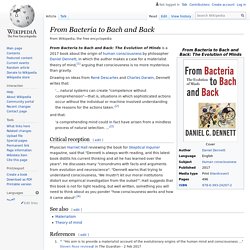
Drawing on ideas from René Descartes and Charles Darwin, Dennett writes that: '... natural systems can create "competence without comprehension"—that is, situations in which sophisticated actions occur without the individual or machine involved understanding the reasons for the actions taken. Content and consciousness. Content and Consciousness - Daniel C. Dennett. Daniel dennett. Lynn Margulis. Lynn Margulis (born Lynn Petra Alexander;[2][3] March 5, 1938 – November 22, 2011)[4] was an American evolutionary theorist and biologist, science author, educator, and popularizer, and was the primary modern proponent for the significance of symbiosis in evolution.
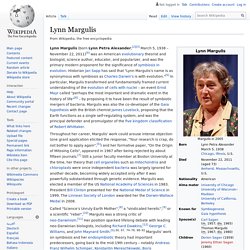
Historian Jan Sapp has said that "Lynn Margulis's name is as synonymous with symbiosis as Charles Darwin's is with evolution. "[5] In particular, Margulis transformed and fundamentally framed current understanding of the evolution of cells with nuclei – an event Ernst Mayr called "perhaps the most important and dramatic event in the history of life"[6] – by proposing it to have been the result of symbiotic mergers of bacteria.
Margulis was also the co-developer of the Gaia hypothesis with the British chemist James Lovelock, proposing that the Earth functions as a single self-regulating system, and was the principal defender and promulgator of the five kingdom classification of Robert Whittaker. Eukaryotic genes. Eukaryotic Gene Regulation. Gene structure. Common features[edit] Regulatory elements can overlap one another, with a section of DNA able to interact with many competing activators and repressors as well as RNA polymerase. For example, some repressor proteins can bind to the core promoter to prevent polymerase binding.[14] For genes with multiple regulatory sequences, the rate of transcription is the product of all of the elements combined.[15] Binding of activators and repressors to multiple regulatory sequences has a cooperative effect on transcription initiation.[16] Although all organisms use both transcriptional activators and repressors, eukaryotic genes are said to be 'default off', whereas prokaryotic genes are 'default on'.[5] The core promoter of eukaryotic genes typically requires additional activation by promoter elements for expression to occur.
Overview: Eukaryotic gene regulation (article) Mendel's demon. Mendel's Demon: Gene Justice and the Complexity of Life - Mark Ridley. Icons of evolution. Icons of Evolution. Some in the scientific community have criticized the book and regard it as pseudoscientific.[5] It was criticised for its claims that schoolchildren are deliberately misled, and its conclusions as to the evidential status of the theory of evolution, which is considered by scientists to be the central unifying paradigm of biology.[6] Kevin Padian and Alan D. Creation science. Creation science or scientific creationism[1] is a branch of creationism that claims to provide scientific support for the Genesis creation narrative in the Book of Genesis and disprove or reexplain the scientific facts,[2] theories and paradigms about geology,[3] cosmology, biological evolution,[4][5] archaeology,[6][7] history, and linguistics.[8] The overwhelming consensus of the scientific community is that creation science fails to produce scientific hypotheses, and courts have ruled that it is a religious view rather than a scientific one.
The creation science texts and curricula that first emerged in the 1960s focused upon concepts derived from a literal interpretation of the Bible and were overtly religious in nature, most notably linking Noah's flood in the Biblical Genesis account to the geological and fossil record in a system termed flood geology. The 1982 ruling in McLean v. Intelligent design. Pseudoscientific argument for the existence of God, Intelligent design (ID) is a pseudoscientific argument for the existence of God, presented by its proponents as "an evidence-based scientific theory about life's origins".[1][2][3][4][5] Proponents claim that "certain features of the universe and of living things are best explained by an intelligent cause, not an undirected process such as natural selection. "[6] ID is a form of creationism that lacks empirical support and offers no testable or tenable hypotheses, so it is not science.[7][8][9] The leading proponents of ID are associated with the Discovery Institute, a fundamentalist Christian and politically conservative think tank based in the United States.
Intellect thought science vs the intelligent design movement. Intelligent design movement. The intelligent design movement is a neo-creationist religious campaign for broad social, academic and political change to promote and support the pseudoscientific[1] idea of intelligent design (ID), which asserts that "certain features of the universe and of living things are best explained by an intelligent cause, not an undirected process such as natural selection.
Most updated curriculum in the world learn about what's in the news. Transfiguration of Jesus. In these accounts, Jesus and three of his apostles, Peter, James, John, go to a mountain (the Mount of Transfiguration) to pray. On the mountain, Jesus begins to shine with bright rays of light. Polyandry in nature. Polyandry. Polyandrous one male mating with many females. Polyandry in nature. Hamilton's theory. Hamilton's rule and the causes of social evolution. Evolutionarily stable strategy. First published as a specific term in the 1972 book by John Maynard Smith,[1] the ESS is widely used in behavioural ecology and economics, and has been used in anthropology, evolutionary psychology, philosophy, and political science. History[edit] Washburn evolution. Washburn evolution. Sherwood Washburn. Sherwood Larned Washburn ((1911-11-26)November 26, 1911 – (2000-04-16)April 16, 2000), nicknamed "Sherry", was an American physical anthropologist and pioneer in the field of primatology, opening it to the study of primates in their natural habitats.
Green-beard effect. The Green-beard effect is a form of selection in which individuals with genes that produce unique observable traits select individuals with the specific trait and thereby the same gene. The social conquest of earth. E o wilson kin selection. E.O. Wilson Proposes New Theory of Social Evolution. Helen grafton kin selection. Kin selection. The evolutionary strategy that favours the reproductive success of an organism's relatives, even at a cost to the organism's own survival and reproduction The co-operative behaviour of social insects like the honey bee can be explained by kin selection. W. D. Hamilton. William Donald Hamilton, FRS (1 August 1936 – 7 March 2000) was an English evolutionary biologist, widely recognised as one of the most significant evolutionary theorists of the 20th century.[1][2]
W. d. hamilton. Beanbag genetics. Mendel first studied pea plants. Meme. Thought or idea that can be shared, in analogy to a gene. Codical domain codex dna. Williams natural selection. Adaptation and Natural Selection. DNA replication. Genic selection. John Maynard Smith. Gaia hypothesis. Theriogenology. Random drift creating adaptation. Francisco Ayala.
Elizabeth Stuart, Queen of Bohemia. Elizabeth Stuart, Queen of Bohemia. Ernst Mayr. Evolution. Local optimum. Sewall Wright. Mendelian inheritance. Ronald Fisher. Hardy–Weinberg principle. Ernst Mayr. Federated States of Micronesia. Antigenic drift. Charles Darwin. Sewall Wright. Motoo Kimura. Mendelian inheritance. Ronald Fisher. Genetic drift. Genetic drift. Hugo de vries. Hugo de Vries. Naturphilosophie. Thomas Hunt Morgan. Gregor Mendel. W. batson evolution. William Bateson. Diverse. Neutralism. 747 saltation. Gradualism. Stretch dc 8 saltation. Fred Hoyle. 747 saltation sir fred howyals. Boeing 747.